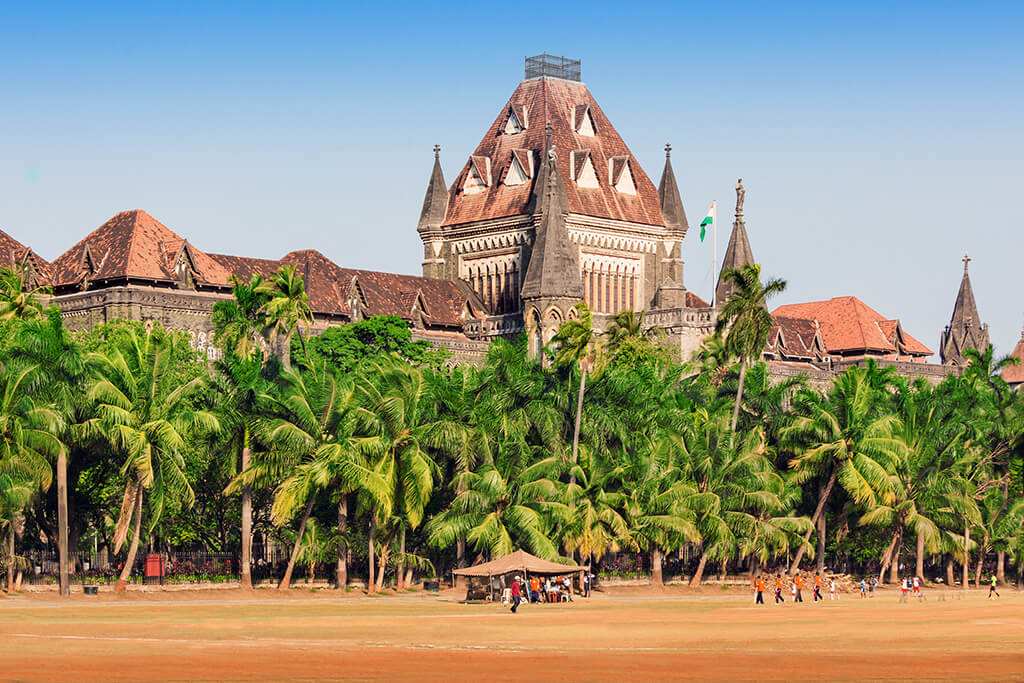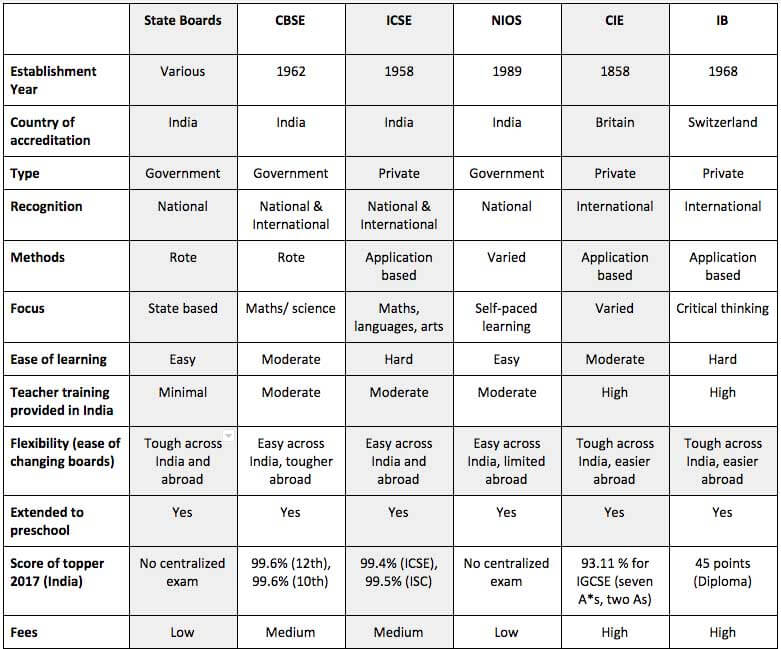- March 23, 2021
AFFORDABLE – QUICK – FREE
When it comes to education in India, there isn’t one standard curriculum that everyone follows. Instead, there are education boards that set the precedent for a student’s future prospects and learning. Because all these boards have different leadership and are better suited for one type of student or family situation than another, it’s important that you have all the knowledge about boards of education in India to make the best decision.
India has 4 education boards. The three most popular education boards in India are:
- CBSE
- IB
- State Board
Without further ado, let’s take a look at the most popular types of education boards in India and evaluate the pros and cons of each.
CBSE ( Central Board of Secondary Education )
The CBSE stands for the Central Board of Secondary Education. Although it’s a government-run board, it has 14,808 locations across India and is present in over 25 countries around the world, including Malaysia and Dubai. It runs the same way for all locations, regardless of the state or the country. For language, CBSE runs English and Hindi medium schools.
Despite its popularity, however, this type of education board in India is the best fit for those who want to pursue a specific line of study or have a unique family situation.
For one, the CBSE is fantastic for students who have parents that frequently transfer jobs and move across the country. Because CBSE has locations in all the big and small cities in India with a universal curriculum, it makes moving and transitioning almost a seamless experience. That will mean little to no disruption toward your educational progress.
Another reason why the CBSE stands out as a board of education in India is that its syllabus emphasizes medical and engineering — especially when it comes to national entrance tests. In general, CBSE is best geared toward those who like to focus on math and science studies rather than the humanities or languages, because the board isn’t as robust in those fields.
The major exams that CBSE runs include the All India Secondary School Examination (AISSE) for Class 10 and the All India Senior School Certificate Examination (AISSCE) for Class 12. This board of education in India also has recently begun a new type of evaluation called the Continuous Comprehensive Evaluation (CCE) for Classes 6 through 10, which aims to test students throughout the year rather than in a final single exam at the culmination of the school year.
Pros
- High diversity due to wider student population from all kinds of backgrounds.
- Standardized exams that test quality material free of any errors.
- The Continuous and Comprehensive Evaluation (CCE) is a unique system that evaluates students from Classes 6-10 based on their curricular and extracurricular activities throughout the year, not just in a single exam at the end.
- Easy accessibility to tutors, resources, and textbooks for any class.
- A high focus on science, math, and application-based subjects.
- National and international recognition.
- A universal system for a seamless transfer across any CBSE school in any location.
- Multitudes of talent search exams and scholarship exams are conducted based off the CBSE syllabus content.
Cons
- Even though many entrance exams are based on CBSE content, the exams are still open to any student in India, regardless of the education board. That means there are more spots reserved for students who are a part of the state boards and fewer seats for the CBSE board.
- The cost of some fees can be higher depending on location.
- The education board is too math and science dominant. It doesn’t offer enough opportunities to explore the arts and humanities.

IB ( International Baccalaureate )
As you might have guessed by the name, International Baccalaureate spans beyond India alone. This educational board is present in over 144 countries with almost 3,500 schools set in place, 130 of which are in India. Instead of a public institution, it is actually a private-run international educational foundation whose headquarters is located in Geneva, Switzerland.
Students who enter IB will automatically be split into three programs. The first is the Primary Year Program, which spans all children from KG to Class 5. Next is the Middle Year Program, which includes Classes 6 to 10. Finally, the diploma program is for the last two classes of 11 and 12.
A major benefit of the IB educational board in India is that it adequately prepares students to apply to universities abroad without the need to take on a load of additional classes. If a student has ever aspired to apply to any US colleges or beyond, IB is potentially a great choice. Not only does it pivot the student toward a future abroad, but also teaches a more well-rounded education. Students won’t only study analytical problems, but will also be taught the arts, humanities, and languages in an integrated and natural flow.
IB also remains one of the best choices out of this list of education boards in India for students who have parents that either wish to move abroad or want a more international experience for their child. Additionally, IB’s programs are smaller in size, which means that all students will receive a better learning experience. The diversity of students will also expose them to a more interconnected culture.
Pros
- The International Baccalaureate education board is one of the most recognized boards by most of the world’s universities, including some of the most prestigious.
- Students can easily apply to universities abroad. For boards like the CBSE, the process is not as simple.
- IB is granted recognition by several international organizations, such as UNESCO, the Council of Europe, and more.
- The school infrastructure is overall better than the buildings and utilities of other education boards in India.
- There is far more focus on a well-rounded education, with emphasis on the arts, humanities, languages, and an experiment-based curriculum.
- It’s the best option for parents who either desire to move abroad or nurture their children with an international learning environment.
Cons
- On the spectrum of fees, IB boards will be on the higher end.
- School locations aren’t as far out and diverse as boards like the CBSE are. They are mostly found only in larger metropolitan and Tier 1 Indian cities.
- It’s slightly harder to switch between educational boards from IB should it be necessary to do so.
- Tuition is more expensive, and resources such as textbooks are in a more limited supply.
State board

Each of the state and union territories within India has its own education boards that are responsible for their primary, secondary, and higher secondary education. The two exams that are run here consist of the Secondary School Certificate (SSC) for Class 10 and the Higher School Certificate (HSC) for Class 12.
One of the biggest factors about state boards that may appeal to people is that it’s highly ideal for families who plan to stay in a state for the long term without moving around. That means it offers the syllabus more flexibility to teach local languages and relate class curriculum to the surrounding culture. State boards are also cheaper in general and the class load is usually less heavy, which means students have more time to enjoy extracurricular activities and sports. All in all, this allows students one of the best student-life balances and proximity to the locality out of all the different boards of education in India.
Pros
- State boards are best for parents who’ve found a job in one location and don’t need to constantly move around.
- Resources such as textbooks and teachers are widely available.
- A less dense curriculum that provides for a student-life balance and valuable time to explore more extracurricular activities and sports.
- A more economically friendly school board system will cost far less out of pocket in fees.
- A higher number of seats are reserved for students affiliated with state boards for entrance exams.
Cons
- The quality of education is solely based on the State government’s ability to keep the state boards running and maintaining the same level of education.
- Not all schools will have the same quality of teaching, and that’s because not all locations and states will have access to the same pool of resources.
- State board schools are not privately owned like IB, so some schools might not even be equipped with a few basic facilities at times.
- Some content errors or mistakes can slip through the cracks.
Conclusion
No matter what education board in India you most align with out of the list, all of them can offer any student a quality education. However, it’s important to take some time to sift through the pros and cons of each type of education board to ensure that every student maximizes a learning process and career outlook that is most favorable and suitable for them.

Which education board is best in India?
Determining the best education board in India relies on recognizing your needs and seeing which board fits you the best.
Want more of a focus on science and math with a more comprehensive grading system in a more international sphere? Go with CBSE. Desire to be associated with a globally well-recognized education board that encompasses a more well-rounded education? International baccalaureate is your best bet. Have a family that’s more settled down in one area and prefers to have more of a student-life balance? Go with your state board.
After doing some basic research, you’ll quickly find an education board that speaks to your strengths and leads you down the right path to success.
Also Read: What to Expect for Your Relocation to India





